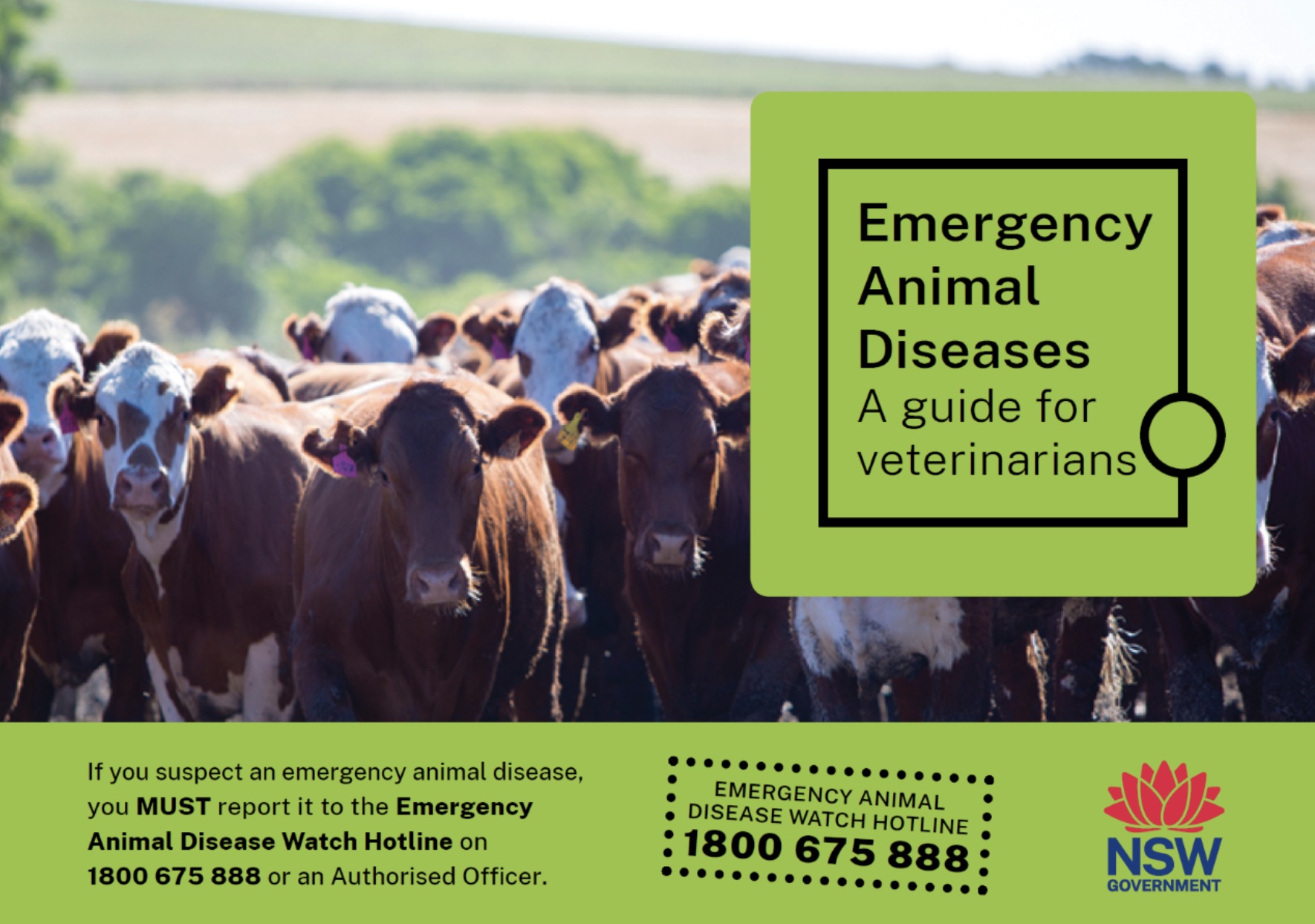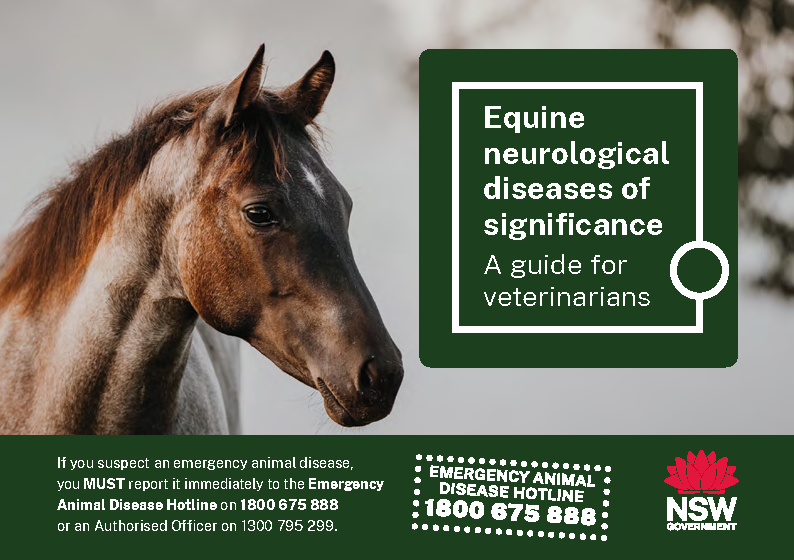
Information for vets
CVO Bulletins
Report unusual disease signs, abnormal behaviour or unexplained deaths in livestock and other animals. If you suspect an emergency animal disease, don't delay! Ring the 24 hour EAD hotline on 1800 675 888.
Emergency animal diseases include:
- African horse sickness
- African swine fever
- Anthrax
- Avian influenza
- BSE
- Equine influenza
- Foot and mouth disease
- Hendra virus
- Japanese encephalitis
- Lumpy skin disease
- Bluetongue virus
Emergency animal diseases: A guide for veterinarians
 A glovebox guide for veterinarians on foot-and-mouth disease, African swine fever, lumpy skin disease, avian influenza and African horse sickness. The guide includes disease information, clinical signs, sampling and laboratory testing, differential diagnoses and transmission pathways as well as key information on biosecurity control, reporting, laboratory information and emergency management training opportunities.
A glovebox guide for veterinarians on foot-and-mouth disease, African swine fever, lumpy skin disease, avian influenza and African horse sickness. The guide includes disease information, clinical signs, sampling and laboratory testing, differential diagnoses and transmission pathways as well as key information on biosecurity control, reporting, laboratory information and emergency management training opportunities.
Equine neurological diseases of significance: A guide for veterinarians
 A glovebox guide for veterinarians on Hendra virus, Japanese encephalitis and other flaviviruses, equine herpes virus 1 and other equine neurological diseases of significance. The guide includes disease information, clinical signs, sampling and laboratory testing, differential diagnoses and transmission pathways as well as key information on biosecurity control, reporting, laboratory information and emergency management training opportunities.
A glovebox guide for veterinarians on Hendra virus, Japanese encephalitis and other flaviviruses, equine herpes virus 1 and other equine neurological diseases of significance. The guide includes disease information, clinical signs, sampling and laboratory testing, differential diagnoses and transmission pathways as well as key information on biosecurity control, reporting, laboratory information and emergency management training opportunities.
Stakeholder glovebox guide for EADs
A glovebox guide (PDF, 6435.38 KB) for livestock owners, producers and those involved in the market chain on biosecurity, EADs and requirements for the safe transport of livestock.
Importance of effective carcass disposal
Improper carcass disposal can have significant impacts on environmental, human and animal health. For more information see Animal carcass disposal.
National standards for private vets working in EAD responses
Previous experiences, including the 2007 Equine Influenza outbreak have shown the need for nationally consistent arrangements including remuneration rates so that when there is an emergency disease response, private practitioners can be engaged efficiently and effectively.
- Private vets will now take part in emergency animal disease (EAD) responses either as an employee of a state or territory government, or as an independent contractor.
- Consistent rates of pay have been agreed, and will be reviewed annually and indexed in line with increases in Commonwealth pay rates.
Further information is available in the national guidance document (PDF, 877.28 KB), which describes the overall context, background and structure of the arrangements. Details are also available on the employment conditions (PDF, 437.46 KB) for vets and what should be in each employment contract (PDF, 501.29 KB).
Got questions? You might find the answers in the Department of Agriculture's Frequently Asked Questions (PDF, 410 KB) document.
Avian Influenza - A guide for veterinarians
The Avian Influenza - A Guide for Veterinarians, together with recorded training provides comprehensive information on Avian Influenza case management, biosecurity protocols, safe sample collection, effective reporting, and situational awareness.
For information on how to submit samples for testing of Emergency Animal Disease visit NSW Animal & Plant Health Labs Submitting Samples.
The National Significant Diseases Investigation Program (NSDIP) provides limited funds for investigation of possible significant new and emerging diseases. The Department's Senior Veterinary Officer for your locality can provide more details. Any submissions for NSDIP funding must include a completed ROADE form (DOC, 128 KB).
The NSW Primary Industries legislation page provides links to all the legislation that is administered by the NSW Minister for Primary Industries.
There is a requirement on all veterinarians to notify the Department or Local Land Services if they know or suspect the presence of a notifiable animal disease.
Online training is available for veterinarians and veterinary professionals that are interested in learning more about Emergency Animal Diseases (EAD), participating in an emergency animal disease response or general biosecurity information. Most training is free, available to complete at any time and is considered suitable as Continuing Professional Development (CPD) for veterinarians. For further information on training available go the training and resources for vets page.
If you have a general query or concern about animal diseases please email staff in Animal Biosecurity at animal.biosecurity@dpi.nsw.gov.au.
Veterinary point of care tests (PoCT) provide field-based or “pen-side” diagnostic information about disease states in animals. Misuse or misinterpretation of tests and inaccurate test results for prohibited matter diseases represents a significant biosecurity risk with implications for producers, vets, communities, and industries. Due to these risks, PoC testing for prohibited matter is prohibited in NSW. It is an offence under Section 28 of the NSW Biosecurity Act 2015 to deal with prohibited matter, and clause 4 of the Biosecurity Regulation 2017 states that testing for the presence of biosecurity matter is a dealing. More information on the use and validation of PoCT for prohibited matter in NSW can be found in the relevant policies and procedures.
A PoCT needs to be validated, used by competent individuals according to manufacturer and regulatory standards to minimise the risk of a biosecurity event occurring. Validation is the process by which a test that has been properly developed, optimised and standardised, is assessed for performance against an intended purpose. To apply to undertake PoCT field validation in NSW, please complete the Validation template. You can return the template or make further enquiries about PoCT via animal.biosecurity@dpie.nsw.gov.au.

